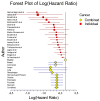Olive oil intake is inversely related to cancer prevalence: a systematic review and a meta-analysis of 13,800 patients and 23,340 controls in 19 observational studies
- PMID: 21801436
- PMCID: PMC3199852
- DOI: 10.1186/1476-511X-10-127
Olive oil intake is inversely related to cancer prevalence: a systematic review and a meta-analysis of 13,800 patients and 23,340 controls in 19 observational studies
Abstract
Dietary fat, both in terms of quantity and quality, has been implicated to cancer development, either positively or negatively. The aim of this work was to evaluate whether olive oil or monounsaturated fat intake was associated with the development of cancer. A systematic search of relevant studies, published in English, between 1990 and March 1, 2011, was performed through a computer-assisted literature tool (i.e., Pubmed). In total 38 studies were initially allocated; of them 19 case-control studies were finally studied (13800 cancer patients and 23340 controls were included). Random effects meta-analysis was applied in order to evaluate the research hypothesis. It was found that compared with the lowest, the highest category of olive oil consumption was associated with lower odds of having any type of cancer (log odds ratio = -0.41, 95%CI -0.53, -0.29, Cohran's Q = 47.52, p = 0.0002, I-sq = 62%); the latter was irrespective of the country of origin (Mediterranean or non-Mediterranean). Moreover, olive oil consumption was associated with lower odds of developing breast cancer (logOR = -0,45 95%CI -0.78 to -0.12), and a cancer of the digestive system (logOR = -0,36 95%CI -0.50 to -0.21), compared with the lowest intake. The strength and consistency of the findings states a hypothesis about the protective role of olive oil intake on cancer risk. However, it is still unclear whether olive oil's monounsaturated fatty acid content or its antioxidant components are responsible for its beneficial effects.
Figures
Similar articles
-
Dietary fat, olive oil intake and breast cancer risk.Int J Cancer. 1994 Sep 15;58(6):774-80. doi: 10.1002/ijc.2910580604. Int J Cancer. 1994. PMID: 7927867
-
Olive oil, other seasoning fats, and the risk of colorectal carcinoma.Cancer. 1998 Feb 1;82(3):448-53. doi: 10.1002/(sici)1097-0142(19980201)82:3<448::aid-cncr4>3.0.co;2-l. Cancer. 1998. PMID: 9452260
-
Olive oil, other dietary fats, and the risk of breast cancer (Italy).Cancer Causes Control. 1995 Nov;6(6):545-50. doi: 10.1007/BF00054164. Cancer Causes Control. 1995. PMID: 8580304
-
Olive oil and cancer risk: an update of epidemiological findings through 2010.Curr Pharm Des. 2011;17(8):805-12. doi: 10.2174/138161211795428920. Curr Pharm Des. 2011. PMID: 21443483 Review.
-
Mediterranean dietary traditions for the molecular treatment of human cancer: anti-oncogenic actions of the main olive oil's monounsaturated fatty acid oleic acid (18:1n-9).Curr Pharm Biotechnol. 2006 Dec;7(6):495-502. doi: 10.2174/138920106779116900. Curr Pharm Biotechnol. 2006. PMID: 17168666 Review.
Cited by
-
Evidence to Support the Anti-Cancer Effect of Olive Leaf Extract and Future Directions.Nutrients. 2016 Aug 19;8(8):513. doi: 10.3390/nu8080513. Nutrients. 2016. PMID: 27548217 Free PMC article. Review.
-
Functional Foods and Bioactive Compounds: A Review of Its Possible Role on Weight Management and Obesity's Metabolic Consequences.Medicines (Basel). 2019 Sep 9;6(3):94. doi: 10.3390/medicines6030094. Medicines (Basel). 2019. PMID: 31505825 Free PMC article. Review.
-
The association between different kinds of fat intake and breast cancer risk in women.Int J Prev Med. 2014 Jan;5(1):6-15. Int J Prev Med. 2014. PMID: 24554986 Free PMC article. Review.
-
Cancer Incidence in Europe: An Ecological Analysis of Nutritional and Other Environmental Factors.Front Oncol. 2018 Jun 13;8:151. doi: 10.3389/fonc.2018.00151. eCollection 2018. Front Oncol. 2018. PMID: 29951370 Free PMC article.
-
Advances in Diet and Physical Activity in Breast Cancer Prevention and Treatment.Nutrients. 2024 Jul 13;16(14):2262. doi: 10.3390/nu16142262. Nutrients. 2024. PMID: 39064705 Free PMC article. Review.
References
-
- Perez-Jimenez F, Alvarez de Cienfuegos G, Badimon L, Barja G, Battino M, Blanco A, Bonanome A, Colomer R, Corella-Piquer D, Covas I, Chamorro-Quiros J, Escrich E, Gaforio JJ, Garcia Luna PP, Hidalgo L, Kafatos A, Kris-Etherton PM, Lairon D, Lamuela-Raventos R, Lopez-Miranda J, Lopez-Segura F, Martinez-Gonzalez MA, Mata P, Mataix J, Ordovas J, Osada J, Pacheco-Reyes R, Perucho M, Pineda-Priego M, Quiles JL, Ramirez-Tortosa MC, Ruiz-Gutierrez V, Sanchez-Rovira P, Solfrizzi V, Soriguer-Escofet F, de la Torre-Fornell R, Trichopoulos A, Villalba-Montoro JM, Villar-Ortiz JR, Visioli F. International conference on the healthy effect of virgin olive oil. Eur J Clin Invest. 2005;35:421–424. Review. - PubMed
-
- Kushi L, Giovanucci E. Dietary fat and cancer. Am J Clin Nutr. 2002;113:63–70. - PubMed
Publication types
MeSH terms
Substances
LinkOut - more resources
Full Text Sources
Medical


